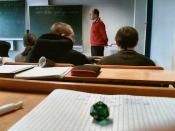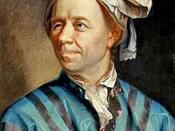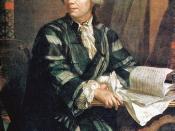Leonhard Euler
Leonhard Euler, from Basel, Switzerland, was one of the most prolific mathematicians of all time. He was born to Margaret and Reverend Paul Euler on April 15, 1707. Right from the start, his father, a pastor, wanted his son to follow in his footsteps and sent him to the University of Basel to prepare for the ministry, but geometry soon became his favorite subject. Throughout his life, he published many books and articles pertaining to mathematics, physics, and other topics. It was once said that "Euler calculated without apparent effort, as men breathe..." Although he was set back by partial blindness in his 20's, and then almost complete blindness in his later life, he was still able to discover some of the most important mathematical works of his time.
Through his teacher Bernoulli, Euler obtained his father's consent to change his major to mathematics. He joined the St.
Petersburg Academy of Science in 1727. When funds were shorts at the academy, he served as a medical lieutenant in the Russian navy from 1727 to 1730. In St. Petersburg he boarded at Bernoulli's son Daniel's home. He became professor of physics at the academy in 1730 and professor of mathematics in 1733, when he married and left Bernoulli's house. His reputation grew after the publication of many articles and his book Mechanica, which presented Newton's dynamics in the form of mathematical analysis for the first time.
By the time of his death in 1783, Euler was nearly blind, and he had contributed immensely to the field of mathematics and geometry. He was one of the greatest mathematicians of all time. His numerous works (over 900 publications) in many areas had a decisive influence on the development of mathematics, an influence that is felt to this day.


